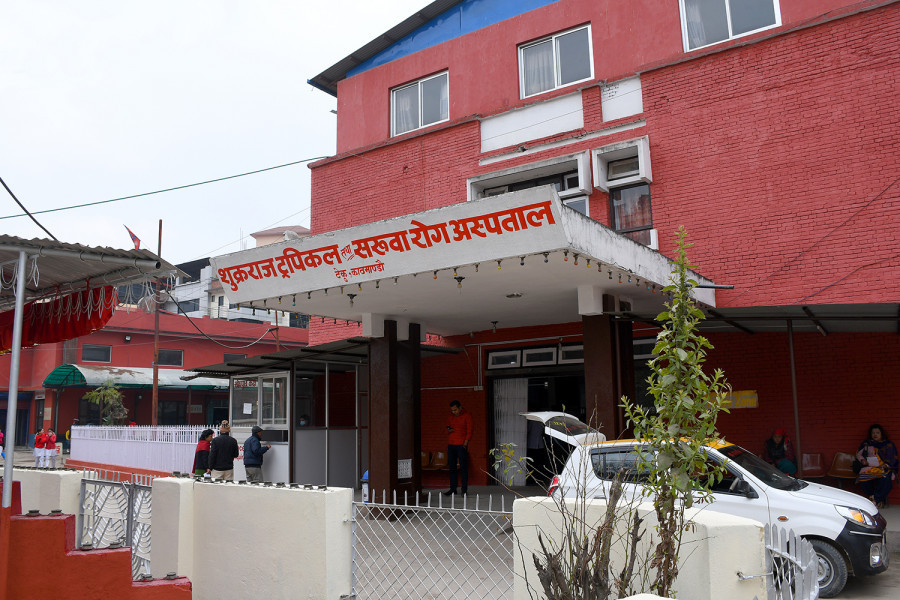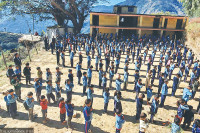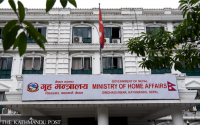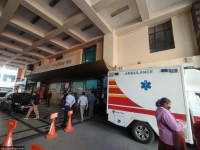National
Patient with flu-like symptoms flees hospital, displaying a chilling lack of gravity on government’s part
Doctors at Sukraraj Hospital say that no security personnel have been deputed to hold patients who refuse to remain in isolation, and they have none of their own.
Arjun Poudel
A 32-year-old Nepali man who had returned from South Korea with a fever and symptoms of the flu has fled from the Sukraraj Tropical and Infectious Disease Hospital.
According to Sagar Kumar Rajbhandari, director of the hospital, the man was brought in on Wednesday afternoon by his wife. As he showed flu-like symptoms, doctors had recommended that he be tested for Covid-19 and placed in isolation.
“But once his wife left, as she was not allowed to remain in isolation with him, the man too refused to stay at the hospital and left,” said Rajbhandari. “What could we do? We don’t have security guards nor police personnel to prevent patients from leaving.”
If the man was suspected to have the coronavirus, his wife, the woman who brought him into the hospital, should also have been isolated and tested, which the Sukraraj Hospital failed to do.
This is not the first time that a patient suspected of being infected with the deadly virus fled the hospital. Nepal’s first, and only, coronavirus patient too left the Sukraraj Hospital without being cleared by doctors, according to the man’s own admission. Earlier, in January, doctors themselves had released two patients suspected of having the coronavirus without waiting for test results.
“As this is the second incident where a patient suspected of the coronavirus left the hospital on his own, we will discuss and take necessary measures to prevent such incidents in the future,” said Dr Bikas Devkota, spokesperson for the Health Ministry.
Despite being pressed for details, Devkota was unable to provide concrete examples of what measures the ministry is planning to institute.
Nearly two months since the coronavirus outbreak, the entire world is on alert, with numerous countries enacting significant measures to limit the spread of the virus. But in Nepal, despite the country’s frail public health infrastructure, the Health Ministry still does not seem serious, said public health experts.
“This incident shows how irresponsible we are,” Dr Baburam Marasini, former director of the Epidemiology and Disease Control Division, told the Post. “How can we trust the government to trace all the people that a patient has come into contact with when they are unable to even hold a patient in isolation?”
Allowing a patient suspected of having Covid-19 puts the entire population at risk, as the man could now go on to spread the disease to hundreds or thousands of others. The government in Italy is now facing tough questions from the public after it admitted that one hospital’s mishandling of the country’s first coronavirus case contributed to its spread across the country. Italy has since reported over 3,000 confirmed cases of the virus.
But, according to a hospital paramedic who spoke on condition of anonymity, Sukraraj Hospital is itself to blame. As patients do not need to pay for treatment, hospital staff aren’t too concerned about discharging patients, he said.
At a time when there is global concern about the spread of Covid-19, Sukraraj Hospital, the primary centre for treatment of Covid-19, should have been provided with security personnel, especially since this is not the first time that a patient has left the facility. But perhaps patients themselves should also be responsible at times of crises, as their fleeing from a hospital could put thousands of lives at risk, say public health experts.
Nepal’s law also provides criminal penalties for those who knowingly infect others with a contagious disease. According to Article 104 (1) of the 2017 Criminal Code, anyone who “intentionally spreads or does such works that could spread contagious diseases” can be jailed for up to 10 years and fined up to Rs 100,000. Negligence resulting in the spread of the disease could also attract a jail term of five years and a fine of Rs 50,000.
“But we cannot expect people to be responsible all the time,” said Dr Senendra Upreti, a former health secretary. “The state’s system should be strengthened and it needs to counsel people about their responsibility. Even if the patient who fled does not have the virus, the chances of others who might be infected will remain as long as the hospital’s shortcomings are not addressed.”
Security officials are in dire need at the Teku hospital, not just to prevent patients from leaving quarantine but also to monitor and make certain that visitors do not enter the isolation wards where their loved ones are being kept. While officials at Sukraraj Hospital said that no personnel have been deputed to provide security, the Home Ministry could assign police or security officials, as two weeks ago, the government activated the Infectious Disease Act 1964. Article 2 (3) of the Act allows the government to hold “any passengers by the official designated for examination in quarantine in hospitals or other places where the official is doubtful that such passengers have developed any infectious disease”.
The hospital has converted its five cabin beds into an isolation facility since the outbreak of the Covid-19 in China’s Hubei Province in late December. The virus has since spread to 85 countries and has killed at least 3,287 and infected 95,607 people across the globe.




 12.58°C Kathmandu
12.58°C Kathmandu














